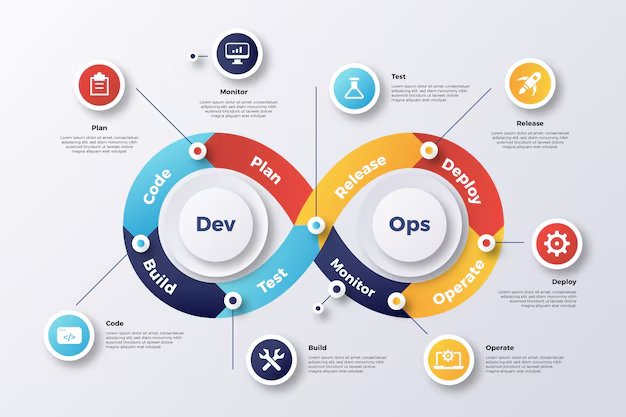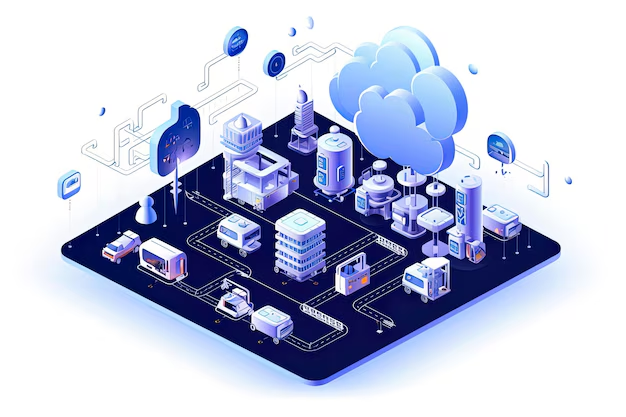Working Hours: Monday - Saturday, 10 AM - 7 PM
Blog Posted on 28 August, 2024 - 10:22 PM

The Power of DevOps: Transforming Software Development's Future
In today's fast-paced digital world, businesses are under constant pressure to deliver high-quality software faster and more efficiently. The traditional methods of software development and IT operations, often working in silos, struggle to keep up with these demands. Enter DevOps—a cultural and professional movement that breaks down these silos, bringing development and operations teams together to accelerate the software delivery process.
What is DevOps?
DevOps is a combination of two key areas: software development (Dev) and IT operations (Ops). It’s not just a set of practices but a philosophy that promotes collaboration, communication, and integration between these traditionally separate teams. The goal is to streamline the process of building, testing, and releasing software, ensuring faster time-to-market, higher quality, and continuous improvement.
The Core Principles of DevOps
- Collaboration and Communication: DevOps fosters a culture where development, operations, and even other departments like QA and security work together seamlessly. This collaboration breaks down barriers, enabling teams to work more efficiently and solve problems faster.
- Continuous Integration and Continuous Delivery (CI/CD): DevOps encourages continuous integration of code changes and continuous delivery of software updates. By automating testing and deployment, CI/CD pipelines help catch bugs early and release updates quickly, ensuring a more reliable software development process.
- Automation: One of the most significant aspects of DevOps is the emphasis on automation. From code testing and deployment to infrastructure management, automating repetitive tasks reduces human error and frees up time for more strategic activities.
- Infrastructure as Code (IaC): DevOps promotes treating infrastructure as code, allowing teams to manage and provision computing resources through scripts or configuration files. IaC enables consistent and repeatable environments, making it easier to scale and manage infrastructure.
- Monitoring and Feedback: Continuous monitoring of applications and infrastructure is crucial in a DevOps environment. By collecting and analyzing data, teams can gain insights into performance, identify issues early, and make informed decisions for improvements.
Benefits of DevOps
- Faster Time-to-Market: By streamlining development and operations processes, DevOps enables faster delivery of new features and updates, giving businesses a competitive edge.
- Improved Quality and Reliability: Automated testing and continuous integration ensure that code changes are thoroughly vetted before reaching production, reducing the risk of bugs and system failures.
- Greater Agility: DevOps practices allow teams to respond quickly to changing market demands, customer feedback, and technological advancements, ensuring that businesses remain agile and adaptable.
- Enhanced Collaboration: DevOps fosters a culture of shared responsibility, breaking down silos and improving collaboration between teams. This leads to better communication, more innovative solutions, and a more cohesive work environment.
- Cost Efficiency: By automating repetitive tasks and optimizing resource management, DevOps reduces operational costs while increasing productivity.
Challenges in Implementing DevOps
While the benefits of DevOps are clear, implementing it is not without challenges. Organizations may face resistance to cultural change, a lack of necessary skills, and difficulties in integrating legacy systems with new DevOps practices. However, with the right leadership, training, and commitment, these challenges can be overcome.
“DevOps is the catalyst that transforms software development, turning collaboration and automation into the foundation of future innovation.”
Conclusion
DevOps is more than just a set of tools or practices—it's a mindset that transforms how organizations develop, deliver, and maintain software.
By embracing DevOps, businesses can achieve faster delivery times, higher-quality products, and a more collaborative and agile working environment. As the software development landscape continues to evolve, DevOps will remain a critical component in driving innovation and success.
Insightful Blogs
Discover insightful blogs that offer valuable perspectives, expert opinions, and engaging content on the latest trends and developments.
Get In Touch
With Us
We are headquartered in Kolkata, India. Send us your message and we shall get back to you soon.
Come and See the Future with Us
Let's make something great together. We are trusted by over 50+ clients. Join them by using our services and grow your business.




